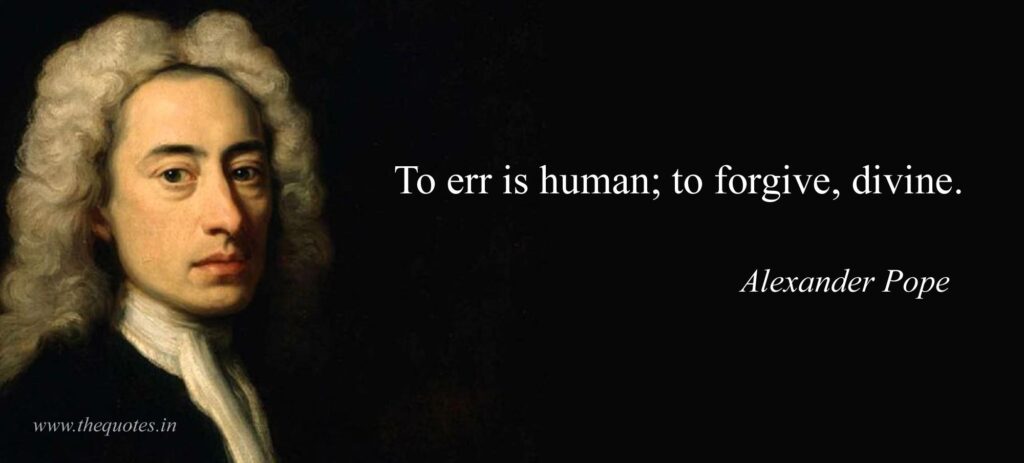You’ve probably heard the phrase ‘To err is human; to forgive, divine.’
It was written by the English poet Alexander Pope, in his poem An Essay on Criticism, in 1711, at age 23.
Quite an interesting young man. He contracted tuberculosis of the bone when he was young, which disfigured his spine and apparently only allowed him to grow to 4 feet, 6 inches.
Alexander grew up on his father’s property in Windsor Forest, where he read avidly and gained an appreciation for the natural world. Though he remained in ill health throughout his life, he was able to support himself as a translator and writer.
So, with apologies to Alexander Pope, I find more and more these days that it is not just the ‘erring’ as humans, where damage is done; it is the ongoing ‘judgement’ that the rest of us cast onto another, when their behaviour has begun to negatively impact on themselves and/or others.
And let’s face it, we all, to a lesser or greater degree, cast judgement on others as well as ourselves, on a day-to-day basis…with our thoughts, words and deeds.
How many of us would, for a 12-hour period, be willing to consciously observe every thought we have about ourselves and others? And what if this also included observing each comment we made, and every behaviour we impacted.
Yes, I know it would do our heads in!!
According to the National Science Foundation, the average person has around 12,000 to 60,000 thoughts per day. Of those, 80% are apparently negative and 95% of our thoughts are repetitive.
That’s a whole lot of negative judgement going on any way you look at it!!
Okay so what’s my point?
The point is…do we really know how much damage we do to ourselves, first and foremost, when we live in a world where we are continually judging ourselves and others in a negative mindset?
I would take a guess and say very few of us have any idea of the damage we are doing; otherwise why do we keep doing it? Kind of like that definition of insanity “doing the same thing over and over again and expecting different results.”
We are living in an age where science can now prove, what our philosophers and teachers have been telling us for millennium, (and what our bodies have always been telling us, if only we would listen) that If we are addicted to thinking negative thoughts (judgement) then most likely we are dealing with fear-based emotions such as anger, frustration, sadness, depression, apathy, anxiety, fear etc.
We know ‘poorly managed, fear-based’ emotions are not good for our health and these feelings can create chronic stress, which in turn upsets the body’s hormone balance, which then depletes the brain chemicals required for happiness. The changes in the brain may affect our likelihood of mental disorders such as anxiety, depression, ADHD, schizophrenia and mood disorders. This also damages the immune system…and can cause physical ailments. It’s a vicious circle.
So, the next time we start to judge ourselves or someone else, what if we were able to firstly take a deep breath, and then energetically back off a little? This would allow some space to more consciously re-view what we were about to say or do…and then choose differently!
We know each of us has that ‘small inner child’; and yet most of us have no conscious idea how it operates…and that is the challenge!
There is now a wealth of information being gathered about Ancestral Trauma or Intergenerational Trauma. In other words, we not only pass down physical traits such as eye and skin colour, researchers have found we can also pass on trauma.
Children can inherit the changes that occur in how their parents’ genes are expressed due to environmental stressors…and those chemical instructions, researchers now believe, can also be passed on.
So, what if we became brave enough to be one of the first in our family, our workplace, our group of friends, to face what we often call ‘our inner demons’.
The Hopi Indians coined it beautifully when they said, ‘as we heal ourselves, we heal five generations back’.
Judging ourselves and others has become a conditioned unconscious reflex for many of us.
We just haven’t been aware we are doing it!
Until now!
What if we stepped into our divinity, into that higher aspect of ourselves, which understands we all make mistakes, and that as human beings we are all ‘works in progress’.
What if we were able to stand back (not judge) and see that person who is ‘erring’, is on their own journey, as we are on ours.
And what if, as a family, as a community, as a workplace, as a human society, we can collectively view their behaviour as a cry for help, and we respond accordingly, from our heart.
Surely that is Divine!
In closing, I love this poem, which speaks to the ‘inner child’ of us all.
CHILDREN LIVE WHAT THEY LEARN
If a child lives with criticism, they learn to condemn.
If a child lives with hostility, they learn to fight.
If a child lives with ridicule, they learn to feel shy.
If a child lives with shame, they learn to feel guilty.
If a child lives with tolerance, they learn to be patient.
If a child lives with encouragement, they learn confidence.
If a child lives with praise, they learn to appreciate.
If a child lives with security, they learn to have faith.
If a child lives with approval, they learn to like themselves.
If a child lives with appreciation and friendship,
They learn to find love in the world.
Author unknown

